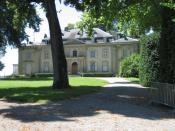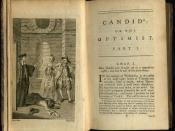Centre College
El Dorado
The Ideal Society
Jordan R. Short
Dr. Steven Froehlich
Humanities 120
May 1, 2014
Imagine a place where there is no crime, no sickness, no violence, and the rarest jewels have no value; a place that is truly perfect. Voltaire conceived a place exactly like this in his most famous work, Candide. Welcome to El Dorado, a place Candide and Cacambo arrive at by mistake, but discover they've stumbled upon a utopia. El Dorado is described by Voltaire as, "The country was cultivated for pleasure as well as for need; everywhere the useful was attractive. The roads were covered, or rather adorned, with carriages brilliant in form and material, bearing men and women of singular beautyâ¦" (17. 43.) Throughout this paper we will explore the ideals of the El Doradian people, as compared to the ideals of ourselves-a social examination, if you will. I separate the ideals of ourselves and the people of El Dorado because it is a utopia; a figment of Voltaire's imagination.
According to the Merriam-Webster Dictionary, the definition of a utopia is this: "an imaginary place in which the government, laws, and social conditions are perfect." In conceiving El Dorado, Voltaire was both pointing out what he saw wrong in the world, and giving us (his readers) his philosophy on how we could change the world to make it a better, and more utopian-like place to live. Voltaire's ideals are ones in which we can strive for as a society but can never fully reach, because as a utopia, it is an imaginary place-one that can never actually come to fruition.
Before we delve into El Dorado and its views, or Voltaire's views rather, we must first seek to understand why Voltaire wrote Candide in the first place. Candide was written during the Enlightenment, the time period in which reason and individualism were emphasized rather than tradition. The goal of Voltaire in writing Candide was to bring his opinions on society out into the open. Candide is a work of satire where Voltaire makes social criticisms through comedy and sometimes outrageous situations, but in these criticisms we can both recognize what Voltaire sees as problematic with society, and suggestions on how to solve these problems. A majority of his suggestions can be found in the utopian society of El Dorado. We must also understand the etymology of the word utopia. "Eu" means good, "topos" means place, and "ou" means no. Roughly, the meaning of utopia is "the good place that is no place." This brings me to my point; though Voltaire was bringing light to social injustices through his satirical work, his notion of this ideal society could never actually occur. However, if we take the advice that Voltaire gives us, we as a society can venture toward a world where a jewel has no rarity value, there is no crime, and all rational people follow all rational laws.
"'Gentlemen,' said the host, 'we can easily see that you are foreigners; we are not accustomed to see any. Pardon us if we began to laugh when you offered us in payment the pebbles of our highroads.'" (17. 44.). In El Dorado, Candide and Cacambo attempt to pay for food at an inn with gold, rubies, and emeralds, the host laughs at their attempt to pay for services with something that has no value in the idealistic society of El Dorado. Rare jewels have long been a source of controversy and violence in the world; the poor want to own them and the rich usually stop at nothing until they have all of the resources possible. "El Dorado" translated from Spanish means "the place of gold." In El Dorado, these naturally occurring substances are abundant, thus they lose their value. The reason a diamond or emerald has value is because of their rarity. The jewels retained no value to the people of El Dorado because they valued things such as knowledge and education over abundant pebbles. This was Voltaire's way of criticizing society; in that we misplace our values on things that truly aren't that important. In these rare resources, we find greed, and greed usually leads to violence. El Dorado has no violence because the jewels have no value, meaning no greed, which in turn leads to no violence. At this end, we are left with a utopian society where everyone in the city of El Dorado is rational. That is, they think rationally so they are without desire for worthless pebbles. I certainly believe it is possible to have a real-world scenario where precious metals were not used as money, just as they were in El Dorado. However, I also believe that it is foolish to think rare jewels will ever not have value. From the beginning of time, gold and silver have been used as currency in most societies. Recently, the United States' government has moved away from a precious metal backed currency to fiat money-money that derives its value from government regulation. Nevertheless, people still strive to have money, whether it is a paper bill or a piece of gold. Thusly, we could strive for a society where the attainment of knowledge was more important than obtaining currency, though it is unlikely to ever happen.
As part of a utopia, the people of El Dorado are rational beings. Rationality effects several areas of life, including laws, the court system, and religion. However, we must first understand that the belief that all people are capable of being rational is an irrational thought in itself. I would argue that rationality is the single most important cog in the wheel that is a utopian society. Stemming from rationality is the basis of a utopia-perfection. Without rationality, chaos ensues. What I mean by this statement is that all people in the real-world are not rational; there will always be irrationality as a result of greed, selfishness, and desire. El Dorado does not have this problem because everyone is content. They are happy with their lot in life, even if they have less than their neighbor. There is no such thing as jealousy or greed. And because of this absence of jealousy and greed, inequality exists within the social structure of El Dorado. It is an interesting concept to think about; El Dorado is a utopia, yet there can still be inequality in which your neighbor may have more or less than you? This is exactly the reason that rationality is vital to maintaining a utopian society. This brings me back to my statement that believing everyone is capable of being rational is an irrational thought. My reasoning behind this statement is that in the real world, there are vices and temptations, whereas in El Dorado there are not. This is what sets El Dorado apart, both literally and figuratively. To achieve a true utopian society, the people in a utopia such as El Dorado must be rational. I do not think it is impossible to have a society where most people thought rationally, but to think there could ever be a society where ever9y single person is rational is doubtful.
More blood has been spilled throughout history in the name of religion than any other establishment. "'Can there be two religions?' He said. 'We have, I think, the religion of everyone; we worship God from morning till evening.'" (18. 46.) In El Dorado, there is no violence as a result of religious persecution. There they practice what is known as Deism. According to the Merriam-Webster Dictionary, deism is the belief in the existence of a supreme being, specifically of a creator who does not intervene in the universe. There is no religious persecution in El Dorado because every citizen accepts this belief of a supreme being who doesn't actually intervene in worldly affairs. This belief is supported again when the old man tells Candide and Cacambo, "'We do not pray to him,' said the good and respectable sage; 'we have nothing to ask him for; he has given us all we need, we thank him without ceasing.'" (18. 46.) Having one universal religion based on rationality would definitely result in less violence. However, I believe the best way to address violence amongst religions would to actually practice what they preach. Tolerance, I believe, is the be-all, end-all of religious violence. Deism is a school of thought that originated during the Enlightenment, and I believe Voltaire is trying to sway his audience to Deism. As a rational being, what isn't there to like about a rational religion, and one in which everyone believes, so there is no violence and disagreement to be had? Again, this is an Enlightenment fantasy. It is possible that citizens within a society could coexist, but I do not think there will ever be a universal religion. It is certainly reasonable to believe that there could be religious tolerance someday, as I believe this is the way that God would want us to interact with each other.
In the end, Candide and Cacambo make the decision to leave El Dorado. I believe this was a rational decision on their behalf. El Dorado was the definition of perfection, yes. The King of El Dorado said to Candide and Cacambo: "â¦all men are free; leave when you will, but the way out is very difficult." (18. 48.) El Dorado had everything that anyone could every want except for one thing: Cunegonde. The love of Candide was not in El Dorado, so his heart was with Cunegonde though his head was in El Dorado. I believe it was perfectly rational for Candide and Cacambo to leave El Dorado. It may have been a utopia, but it didn't have the one thing Candide wanted. I believe Candide and Cacambo had two options when it came to the decision to stay or leave El Dorado:
Stay in El Dorado and remain "happy" among the perfectly rational citizens of El Dorado. Never having to fear anything, because they'd never go hungry or be threatened with violence.
Leave El Dorado so that Candide and Cunegonde are reunited. Live richly with the jewels that were taken from El Dorado and have his heart's desires fulfilled.
When it came to making the decision to leave, I think Candide and Cacambo made the right decision. And I think most people would make the same decision if they were to be put into the same situation.
Throughout this essay, we have discussed the characteristics of El Dorado. El Dorado was in a remote location, one that if stumbled upon and left, as Candide and Cacambo did, would never be able to be reached again. The physical distance of El Dorado from any other place in the world of Candide was a metaphor for the distance of being able to reach a utopian-like society in the real world. Voltaire certainly believed that society could reach a type of society where there was less crime, less violence, and one where we placed value on education and the sciences rather than money. I believe Voltaire got his views on society across to the reader very effectively. I believe it would be smart to take some of his suggestions and apply them to our everyday life; never let your lot in life determine your outlook on life itself. Be satisfied in what you do have rather than focus on what you do not. And most importantly, Pangloss's lesson to Candide, "Everything is made to serve an end." That is, everything happens for a reason, so let it be and it will eventually work its way out.
Voltaire, and Donald Murdoch Frame. Candide, Zadig and Selected Stories. New York: Signet Classics, 2009. Print.


